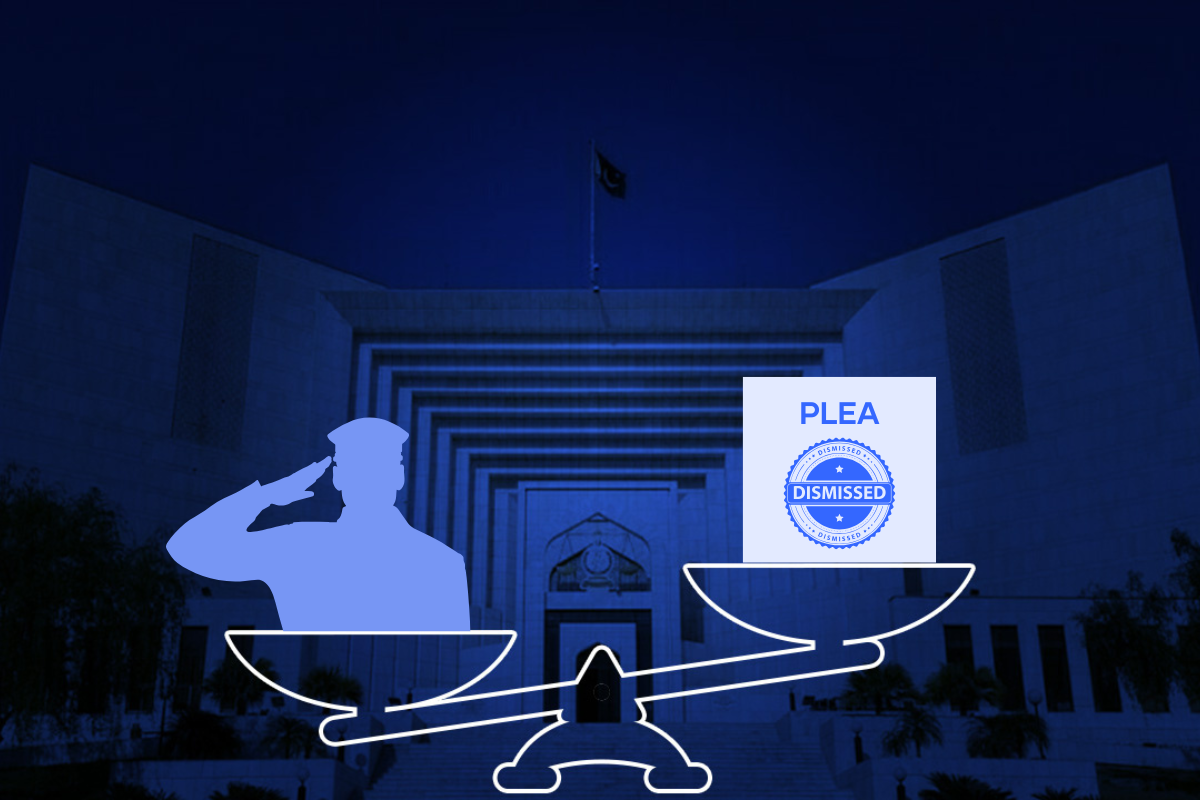Pakistan’s constitutional bench rejects plea against army chief’s tenure extension
Seven-member bench dismisses plea on non-pursuit after petitioner fails to show up; upholds objections raised by Registrar Office

Aamir Abbasi
Editor, Islamabad
Aamir; a journalist with 15 years of experience, working in Newspaper, TV and Digital Media. Worked in Field, covered Big Legal Constitutional and Political Events in Pakistan since 2009 with Pakistan’s Top Media Organizations. Graduate of Quaid I Azam University Islamabad.

An illustration depicting Supreme Court's decision on petition challenging the extension of the Chief of Army Staff (COAS) and other services chiefs' tenures to five years.
Nukta
The Supreme Court of Pakistan’s constitutional bench dismissed on Tuesday a petition challenging the extension of the Chief of Army Staff (COAS) and other services chiefs' tenures to five years.
A seven-member bench, headed by Justice Aminuddin Khan, dismissed the case due to the petitioner's non-pursuit after he failed to show up in court. The bench upheld objections raised by the Registrar Office and deemed the petition inadmissible.
The bench included justices Ayesha Malik, Muhammad Ali Mazhar, Hasan Azhar Rizvi, Jamal Mandokhail, Naeem Akhtar Afghan, and Musarrat Hilali.
Petitioner Mehmood Akhtar Naqvi had raised legal objections to the extension of the army chief’s tenure.
Earlier this month, Pakistan’s parliament passed significant amendments to the Pakistan Army Act, extending the army chief’s term from three to five years.
- YouTubewww.youtube.com
The revisions to Clause 8C of the Act removed age and service duration constraints, granting the prime minister authority to approve reappointments or extensions.
Under the amended law, General Syed Asim Munir, whose term ends in November 2027, could serve until 2032 if reappointed by the prime minister.
- YouTubewww.youtube.com
While the government argues the amendments ensure continuity in military leadership, critics warn they could consolidate power within the military.
Other cases addressed
The bench also dismissed a petition challenging judges’ speeches in parliament, citing procedural flaws and non-pursuit. Justice Muhammad Ali Mazhar emphasized the importance of adhering to proper legal channels and criticized poorly structured cases for burdening the judiciary.
In a separate case concerning dual FIR registrations, Justice Jamal Mandokhail expressed frustration over frivolous litigation contributing to the backlog of over 60,000 pending cases. He admonished the petitioner’s counsel for filing what he deemed an unnecessary plea.
The court also examined a suo motu case on taxing underground water extraction. Law officers from Punjab and Khyber Pakhtunkhwa informed the court of existing legislation in their provinces, while the bench directed other provinces to expedite legal frameworks. Justice Mazhar warned that failure to legislate could lead to prolonged litigation.
Meanwhile, Justice Ayesha Malik recused herself from hearing a suo motu case involving the non-payment of salaries by a private TV channel. The matter was assigned to a new bench, with Justice Aminuddin Khan stressing the need for swift resolution. The proceedings were adjourned.







Comments
See what people are discussing